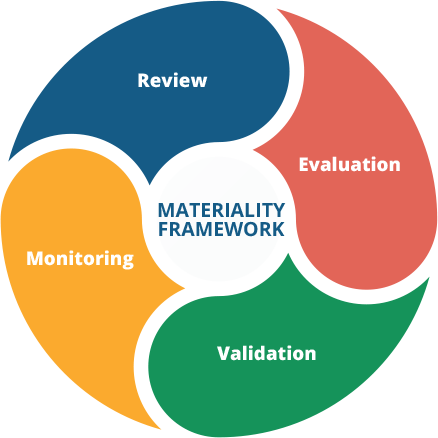Our Materiality Process

Understanding our materiality assessment
We remain committed to providing clear, comprehensive, and reliable sustainability disclosures. Our materiality assessment framework is built to ensure transparency and accountability, enabling our stakeholders to evaluate our ESG performance with confidence.
To identify and prioritize the sustainability issues that matter most, we employ a structured materiality assessment process that considers both business imperatives and stakeholder expectations. In 2024, the results of our assessment remained consistent with previous years, as there were no significant changes in our operations or external context. We continue to focus on the material topics identified in our last assessment, which reflect the most relevant economic, environmental, social, and governance concerns of our stakeholders.
Our materiality process framework
SMC follows a structured materiality process designed to ensure that our sustainability priorities remain relevant, impactful, and aligned with our business strategy. This process includes:
Review of Business Context and Stakeholder Expectations: We assess ongoing and emerging sustainability trends, regulatory developments, and global best practices to ensure alignment with stakeholder concerns and business imperatives.
Evaluation of Material Topics: Our Sustainability Working Team reviews and updates material topics based on their relevance and impact, ensuring they reflect current priorities and support corporate objectives.
Validation and Integration: We validate findings with senior leadership and integrate them into our sustainability strategy and reporting process.
Continuous Monitoring and Reporting: While we did not conduct a full reassessment in 2024, we continuously monitor shifts in the internal and external environment to remain agile in our sustainability efforts.
Our Material Topics

We align our material topics with the United Nations Sustainable Development Goals (SDGs) to ensure that our sustainability initiatives contribute meaningfully to global imperatives. The above table illustrates how our key focus areas correspond to the SDGs and reaffirms our commitment to the 2030 Agenda for Sustainable Development.
Each material topic reflects the most pressing ESG issues relevant to our business and stakeholders.
Our environmental topics align with SDGs on climate action, responsible consumption, and ecosystem preservation. Our social topics support global health, education, decent work, and equality objectives. Meanwhile, our governance topics reinforce our ethical foundation, risk resilience, and digital innovation, advancing global efforts to promote transparency, industry leadership, just institutions, and partnerships for sustainable development.
Our ESG data collection process
We worked closely with Environmental, Social, and Governance data providers and consolidators and their respective sustainability working teams in the business units to collect the data used in this report. For our 2024 report, we have updated our standardized data templates to incorporate the latest information relevant to ESG reporting. The standardized data templates have also been strengthened
by incorporating user feedback, improving efficiency, and streamlining data collection, validation, and consolidation. Company for the next one to two years. We endeavor to create and launch sustainability strategies, programs, and initiatives around these high priority topics to be able to address the risks and priorities they present to the Group. The remaining 8 topics were identified as moderate priority issues. These topics are already embedded in the company’s practices or are specific only to certain subsidiaries, rather than across all. We continue to track and monitor data related to these moderate priority issues.
We are committed to full transparency and accountability in our ESG actions and disclosures to all our stakeholders. We adhere to global and local standards, ensuring that the data disclosed in this report are accurate, balanced and complete.
We have started to collect our Scope 3 GHG emissions data. To support this effort, we developed a standardized data template to capture relevant information for estimating Scope 3 emissions. This data template incorporates principles from the GHG Protocol: Corporate Value Chain (Scope 3) Standard to enhance the accuracy and consistency of our data.
Data Collection Process
The Sustainability Working Teams from the business units collected, verified, and consolidated data at the business unit level before submitting it to the SMC parent company. The Corporate Sustainability Office then reviewed and analyzed the data to ensure completeness and quality before incorporating it into this report. Working alongside the Corporate
Sustainability Office were the Corporate Affairs Office, Corporate Human Resources, Corporate Finance, Office of the General Counsel, and the San Miguel Foundation, together forming the SMC Sustainability Core Team.
We are working on strengthening and automating our data collection and validation processes, using data analytics
to gain more insights into risks and opportunities across our operations. Additionally, one of our key businesses, SMGP, has already obtained external assurance for its sustainability reports for 2021-2023, and we are actively working to extend similar assurance to our other businesses within the next two years.